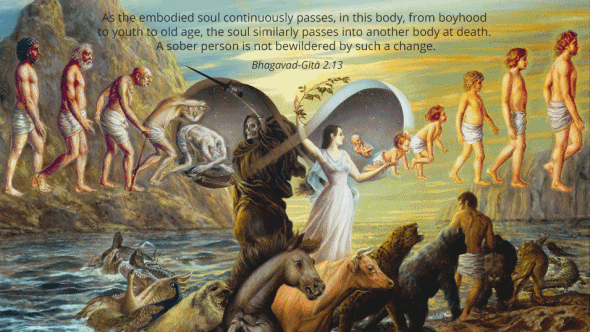
Socrates was “canceled” during the Athenian Cancel Culture.
Socrates believed that because of the immortality of the soul, death could not be evil, because to free the soul by guiding it to the eternal truths was the entire point of life.
When pressed by his friends as to why he believed that our souls were immortal, Socrates stated:
the soul must be immortal because life always emerges after physical death, as we see in nature, as life springs up from decaying organic matter. Just as nature makes a way for new life coming out of decay, so too must the soul survive physical death. Death, Socrates believed, must be like waking up from a sleep.
He also believed that how humans tend to remember things that they have had no experience of in their lifetimes — referred to as the principle of recollection — proves this hypothesis.
He stated that nobody “needs to be taught what a circle or a triangle is.” People know these concepts naturally, which suggests that they must have learned things like these in a former life.
Socrates then argued that the soul was immortal because of something he called “affinity.” His reasoning was thus: immortal beings, such as gods, are normally invisible by their very nature. Despite his belief in Zeus or Apollo or other gods, they were not ordinarily seen taking strolls along the streets of Athens, he noted. However, the human soul knows that they exist; how could the soul do so without having at least a bit of the divine in itself?
Socrates went on to describe the soul by saying that it is like a cloak made by a weaver; just as the cloak continues to exist after the weaver dies, so too must the human soul live after the body dies.
It was widely believed then — and still is today — that it was Socrates’ frequent ridicule of democracy that was really on trial, however.
The articulate stone cutter had long insisted that democracy was a morally corrupt voting system in which greedy demagogues hoodwinked the ignorant mob. His words when sentenced to death paraphrased:
Death is either a migration of the soul to see all my old friends once more. Or, it is like a midsummer night’s sleep. So peaceful never to be disturbed by a dream. How many of us have had such wonderful nights? Go ahead, do your best.
***
KAPILA MUNI EXPLAINS THE TRANSMIGRATION OF THE SOUL:
“In this way the living entity gets a suitable body with a material mind and senses, according to his fruitive activities. When the reaction of his particular activity comes to an end, that end is called death, and when a particular type of reaction begins, that beginning is called birth.”
From time immemorial, the living entity travels in the different species of life and the different planets, almost perpetually. This process is explained in Bhagavad-gītā. Bhrāmayan sarva-bhūtāni yantrārūḍhāni māyayā: [Bg. 18.61] under the spell of māyā, everyone is wandering throughout the universe on the carriage of the body offered by the material energy. Materialistic life involves a series of actions and reactions. It is a long film spool of actions and reactions, and one life-span is just a flash in such a reactionary show. When a child is born, it is to be understood that his particular type of body is the beginning of another set of activities, and when an old man dies, it is to be understood that one set of reactionary activities is finished.
We can see that because of different reactionary activities, one man is born in a rich family, and another is born in a poor family, although both of them are born in the same place, at the same moment and in the same atmosphere. One who is carrying pious activity with him is given a chance to take his birth in a rich or pious family, and one who is carrying impious activity is given a chance to take birth in a lower, poor family. The change of body means a change to a different field of activities. Similarly, when the body of the boy changes into that of a youth, the boyish activities change into youthful activities.
It is clear that a particular body is given to the living entity for a particular type of activity. This process is going on from a time which is impossible to trace out. Vaiṣṇava poets say, therefore, anādi karama-phale, which means that these actions and reactions of one’s activity cannot be traced, for they may even continue from the last millennium of Brahmā’s birth to the next millennium. We have seen the example in the life of Nārada Muni. In one millennium he was the son of a maidservant, and in the next millennium he became a great sage. (S.B.3.31.44)
The transmigration of the soul is also explained in Bhagavad-gita 2.13:
dehino ‘smin yathā dehe
kaumāraṁ yauvanaṁ jarā
tathā dehāntara-prāptir
dhīras tatra na muhyati
dehinaḥ—of the embodied; asmin—in this; yathā—as; dehe—in the body; kaumāram—boyhood; yauvanam—youth; jarā—old age; tathā—similarly; dehāntara—transference of the body; prāptiḥ—achievement; dhīraḥ—the sober; tatra—thereupon; na—never; muhyati—deluded.
As the embodied soul continually passes, in this body, from boyhood to youth to old age, the soul similarly passes into another body at death. The self-realized soul is not bewildered by such a change.
Since every living entity is an individual soul, each is changing his body every moment, manifesting sometimes as a child, sometimes as a youth, and sometimes as an old man. Yet the same spirit soul is there and does not undergo any change. This individual soul finally changes the body at death and transmigrates to another body; and since it is sure to have another body in the next birth—either material or spiritual—there was no cause for lamentation by Arjuna on account of death, neither for Bhīṣma nor for Droṇa, for whom he was so much concerned. Rather, he should rejoice for their changing bodies from old to new ones, thereby rejuvenating their energy. Such changes of body account for varieties of enjoyment or suffering, according to one’s work in life. So Bhīṣma and Droṇa, being noble souls, were surely going to have either spiritual bodies in the next life, or at least life in heavenly bodies for superior enjoyment of material existence. So, in either case, there was no cause of lamentation.
Any man who has perfect knowledge of the constitution of the individual soul, the Supersoul, and nature—both material and spiritual—is called a dhīra or a most sober man. Such a man is never deluded by the change of bodies. The Māyāvādī theory of oneness of the spirit soul cannot be entertained on the ground that spirit soul cannot be cut into pieces as a fragmental portion. Such cutting into different individual souls would make the Supreme cleavable or changeable, against the principle of the Supreme Soul being unchangeable.
As confirmed in the Gītā, the fragmental portions of the Supreme exist eternally (sanātana) and are called kṣara; that is, they have a tendency to fall down into material nature. These fragmental portions are eternally so, and even after liberation, the individual soul remains the same—fragmental. But once liberated, he lives an eternal life in bliss and knowledge with the Personality of Godhead. The theory of reflection can be applied to the Supersoul who is present in each and every individual body and is known as the Paramātmā, who is different from the individual living entity. When the sky is reflected in water, the reflections represent both the sun and the moon and the stars also. The stars can be compared to the living entities and the sun or the moon to the Supreme Lord. The individual fragmental spirit soul is represented by Arjuna, and the Supreme Soul is the Personality of Godhead Śrī Kṛṣṇa. They are not on the same level, as it will be apparent in the beginning of the Fourth Chapter. If Arjuna is on the same level with Kṛṣṇa, and Kṛṣṇa is not superior to Arjuna, then their relationship of instructor and instructed becomes meaningless. If both of them are deluded by the illusory energy (māyā), then there is no need of one being the instructor and the other the instructed. Such instruction would be useless because, in the clutches of māyā, no one can be an authoritative instructor. Under the circumstances, it is admitted that Lord Kṛṣṇa is the Supreme Lord, superior in position to the living entity, Arjuna, who is a forgotten soul deluded by māyā.
Compiled by Mohini Devi









Speak Your Mind